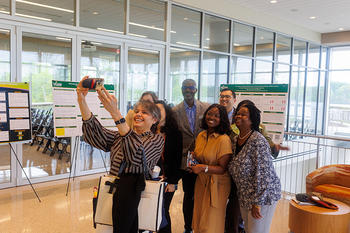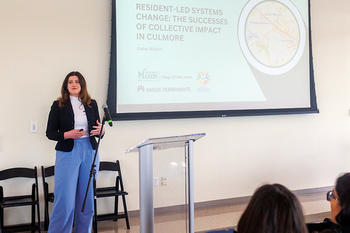In This Story
The inaugural Empowered Communities Northern Virginia Public Health conference, held on April 19, stands as a testament to Mason's leadership in tackling critical public health challenges. Spearheaded by Mason's School of Nursing, the event brought together a diverse array of participants including public health leaders, practitioners, and cross-sector stakeholders from across the region.

“Today’s social challenges are interconnected and multifaceted, requiring us to work collaboratively rather than in isolation. At Mason, we recognize that complex problems need holistic solutions, and partnerships are vital. We extend our deepest gratitude to our community partners whose unwavering support played a pivotal role in driving meaningful change,” remarked Rebecca Sutter, director of Empowered Communities.
In addition to exploring innovative strategies to combat opioid addiction, enhance community support networks, and promote professional development, the conference facilitated robust discussions on topics such as resident-led systems change, recovery in communities of color, and the efficacy of collective impact initiatives in addressing public health challenges.
Empowered Communities serves as an umbrella organization designed to holistically address public health challenges through a three-pillared approach:
- Treatment Services focuses on direct clinical intervention and treatments offering specialized population-based programs to cater to individuals unique needs.
- Community Engagement emphasizes proactive interaction with the community with intiaitves that foster support, resources, and coordinated care within community networks.
- Communities of Practice is dedicated to professional development, knowledge sharing, and collaboration. Our programs endeavors to equip professionals and community members with the tools, knowledge, and networks they need to drive impactful change in public health.

The impact behind the Empowered Communities model relies on community partnerships to increase awareness and sustain the ability to continue building access points. Prince William Health District’s Kirstin Hope Sievers presented to all attendees the results of her opioid needs assessment in the Greater Prince William area.
“The assessment provided us with a timeline of how the opioid epidemic has impacted the Greater Prince William region, but more so, it allowed us to strengthen our public health 3.0 approach through community engagement efforts. Community engagement begins with partnerships that add dimension to the relationships engrained within the communities we serve,” Sievers remarked. “[The] Public Health Conference was a powerhouse of research, community partners, and innovation. I can't wait to see this collaborative continue to bring best practices into the communities we serve.”
The conference also included the Learning Lab for Community Health Public Health Case Challenge where graduate students were paired in teams of two, tasked with researching recovery in youth, while developing a wellness model for opioid use disorder in adolescent and young adults. Ashley Wiest, nurse practitioner and project coordinator, shared with participants the importance of this type of workforce development model, like the Learning Lab for Community Health.
The REAN Foundation highlighted the power of technology in working together to raise awareness and provide support to individuals who struggle to stay connected and engaged in their treatment plans and systems of care. Peer Recovery Specialists Wendy Niles and Marlon Turner shared invaluable insights and best practices in peer recovery support, care coordination, and the peer’s role in treatment services for Medication-assisted Treatment for opioid use disorder.
The conference provided a fertile ground for networking and forging partnerships among public health professionals, community organizations, and academic institutions.
Thank you to the Conference Working Group, who made the event happen:
- Rebecca Sutter, Professor of Nursing & MAP & EC Director
- Nancy Spencer, Program Manager, EC
- Allison West, Care Coordination Manager, EC
- Samba Pathak, Program Manager & Interim Lab Manager
- Sarah Moore, Workforce Development Manage
- Ashley Wiest, Learning Lab Project Coordinator & NP Provider
- Rebecca Hurd, Senior Community Coordinator
- Mary Righi, Clinical Operations Coordinator, MAP
- Katie Wilson, Program Manager, Bailey’s Crossroads & Culmore PBI Coalition
